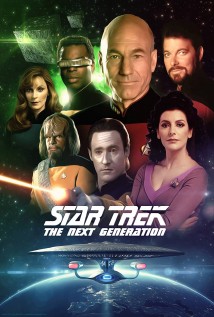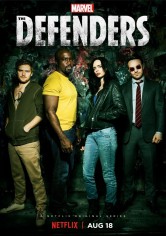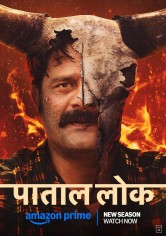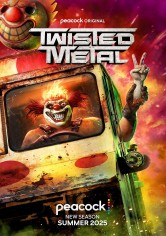
Set almost 100 years after Captain Kirk's five year mission, a new generation of Starfleet officers set off in the U.S.S. Enterprise D on their own mission to go where no one has gone before.
Stars: Patrick Stewart, Brent Spiner and Jonathan Frakes
Full Cast: Marina Sirtis, Brent Spiner, Michael Dorn, Gates McFadden, Majel Barrett, Wil Wheaton, Colm Meaney, James G. Becker, Denise Crosby, Whoopi Goldberg, Diana Muldaur, Patti Yasutake
Episode Guide
Season 7
May 23, 1994Episode 26 All Good Things... (2)
May 23, 1994Episode 25 All Good Things... (1)
May 16, 1994Episode 24 Preemptive Strike
May 9, 1994Episode 23 Emergence
May 2, 1994Episode 22 Bloodlines
April 25, 1994Episode 21 Firstborn
March 28, 1994Episode 20 Journey's End
March 21, 1994Episode 19 Genesis
February 28, 1994Episode 18 Eye of the Beholder
February 21, 1994Episode 17 Masks
February 14, 1994Episode 16 Thine Own Self
February 7, 1994Episode 15 Lower Decks
January 31, 1994Episode 14 Sub Rosa
January 17, 1994Episode 13 Homeward
January 17, 1994Episode 12 The Pegasus
November 29, 1993Episode 11 Parallels
November 22, 1993Episode 10 Inheritance
November 15, 1993Episode 9 Force of Nature
October 18, 1993Episode 5 Gambit (2)
October 11, 1993Episode 4 Gambit (1)
September 20, 1993Episode 1 Descent (2)
Season 6
Season 5
Season 4
Season 3
Season 2
Season 1
Best Star Trek: The Next Generation Episodes
Top 20 (Ranked)
June 1, 1992 9.5 6509 votesS5E25 The Inner Light
9.5 6509 votesS5E25 The Inner Light
June 18, 1990 9.4 4575 votesS3E26 The Best of Both Worlds (1)
9.4 4575 votesS3E26 The Best of Both Worlds (1)
September 24, 1990 9.3 4319 votesS4E1 The Best of Both Worlds (2)
9.3 4319 votesS4E1 The Best of Both Worlds (2)
February 13, 1989 9.2 4892 votesS2E9 The Measure of a Man
9.2 4892 votesS2E9 The Measure of a Man
February 19, 1990 9.2 4709 votesS3E15 Yesterday's Enterprise
9.2 4709 votesS3E15 Yesterday's Enterprise
May 23, 1994 9.0 8209 votesS7E25 All Good Things... (1)
9.0 8209 votesS7E25 All Good Things... (1)
March 23, 1992 9.0 3716 votesS5E18 Cause and Effect
9.0 3716 votesS5E18 Cause and Effect
December 21, 1992 8.9 3124 votesS6E11 Chain of Command (2)
8.9 3124 votesS6E11 Chain of Command (2)
February 7, 1994 8.8 3181 votesS7E15 Lower Decks
8.8 3181 votesS7E15 Lower Decks
January 25, 1993 8.6 2859 votesS6E12 Ship in a Bottle
8.6 2859 votesS6E12 Ship in a Bottle
March 12, 1990 8.5 3591 votesS3E16 The Offspring
8.5 3591 votesS3E16 The Offspring
January 1, 1990 8.5 3226 votesS3E10 The Defector
8.5 3226 votesS3E10 The Defector




User Reviews
Watchseries; I love TNG so much. All the characters are superb and Captain Picard is the best Captain ever. My favourite episode is always have been The Inner Light. 10/10.
I love TNG so much. All the characters are superb and Captain Picard is the best Captain ever. My favourite episode is always have been The Inner Light. 10/10.
Star Trek: The Next Generation watchseries. It's depressing to read a comment from one ST fan bashing another. Can we all agree on one thing: that the universe of Star Trek changed (perhaps in a modest way) not only the way people viewed sci-fi but also how they envision the future?
Each of the four series is excellent in their respect ways:
(1) ST-TOS for starting it all and for revealing Roddenbury's creative genius. TOS has influenced American culture in many subtle ways ("beam be up, Scotty"). Sure, some of the old episodes were weak ("brain, what is brain?") but compare those to the many excellent, thought-provoking episodes. TOS stands on its own (much like the original "Star Wars") and all other ST series are compared against it.
(2) ST-TNG resurrected the series with fresh characters and technologies (can you forget the always malfunctioning holodeck?). Patrick Stewart was a bold choice to play the captain and the supporting cast was excellent. While the first two seasons were weak, the series was going full steam by the third year. The story lines overlapped episodes (which many of you deride as soap opera-ish, but I loved it) providing a sense of character development. While I love all the ST's, TNG is my favorite.
(3) ST-DS9 overlapped and continued where TNG left off. A darker vision, it also maintained the continuous story line technique. Like its predecessor, it was weak in the beginning but soon came into its own. While I will miss DS9, I feel that seven seasons is enough; any longer and you will weaken the production values.
(4) ST-V departs from the other three series (where the players start from Earth and move outwards), Voyager has an original twist: start far away and revolve the show around the characters getting home (moving inwards). And while there's a certain "Melrose Place in Outer Space" feel to it, Voyager is a fine show (I can't quite get myself to call it "excellent" yet). Starting in June ST-V has a new, critical mission: it will now carry the ST franchise alone.
In summary, I believe that each show has brought its own unique contribution to creating/continuing the ST phenomenon. They are all great creative efforts and each should be admired.
I say down with "the Force" and up with "live long and prosper." Make it so, Number One. Engage.
In an early episode, Captain Picard delivers a line from Hamlet: "What a piece of work is a man! How noble in reason, how infinite in faculty! In form and moving how express and admirable! In action how like an Angel! in apprehension how like a god!" But he delivers it with conviction instead of irony, and by doing so creates the thesis of the entire franchise.
Star Trek was never meant to be a realistic depiction of what the future will be like; rather, it's an optimistic argument for what the future could be like. Our heroes on the new Starship Enterprise are noble and rational, and the writing is more concerned with ethics than with punch-ups. Fans of Captain Kirk's red-blooded man of action might be disappointed, but then this is a more mature version of Star Trek. As we mature, we realize there are better ways to solve our problems than with violence. Patrick Stewart's Shakespearean captain is a renaissance man, capable of using the right words and unexpected actions to overcome obstacles, and he needs neither a hairpiece nor a fight scene to prove his character.
The show's other standout star is the android Data, Spock's opposite yet kindred spirit. Where Spock repressed his emotions and was disdainful of illogical humans, Data is curious about our foibles and aspires to be more like us. That implies that being human is not a curse, but something wonderful and virtuous.
There are no space wars in The Next Generation, and for a good reason: creator Gene Roddenberry hoped that by the 24th century war would be a thing of the past. The interpersonal conflicts and domestic dramas of other shows are here replaced by adventure and exploration. Human nature doesn't have to be absolute: people can change, and humanity can grow and evolve. Star Trek: The Next Generation is seven seasons of optimistic, outward-looking space adventure for people who believe that the human race doesn't need to be defined by the villains it faces, but by its own innate spirit.
Following the success of the Star Trek movies in the mid 1980s, the producers decided to put ST back on the small screen with a shiny new Enterprise a new crew and a whole host of new species worlds and enemies. The first season and the majority of the second season are a bit shaky but from the third season it picks up massively. Patrick Stewart is now the captain, a more cerebral, diplomatic captain and played wonderfully. This series introduced far more relationships between the crew (Troi and Riker, Worf and his son, Crusher and Picard) which play out beautifully over the course of the series. The Special effects considering their now nearly 15-20 years old still look good and the Enterprise D is a true flagship vessel.
There's so many good episodes it's kind of hard to pick out anymore than the main standouts most people have mentioned already, Yesterday's Enterprise, The Best of Both Worlds, The Inner Light are probably the most popular but everything, certainly post seasons one and two provides good solid sci fi.
The occasional campiness of the 1960's Star Trek series was not at all evident in Star Trek: The Next Generation, arguably the best science fiction television series to ever be aired. It's funny TNG wound up so brilliant, considering the first two seasons were a bit iffy in terms of quality. The show ended up the ultimate representation of Star Trek, with an immensely engaging crew with a great sense of camaraderie, intelligent and intriguing stories, and special effects that were excellent by television standards.
With the exception of Wil Wheaton, the cast was uniformly superb. Patrick Stewart had a lot to live up to as a successor to William Shatner's Kirk. With his magnetic presence and wonderful acting chops, he's crafted a very different individual from Kirk, and probably my favorite Trek character, period. Jonathan Frakes made for a likeable, intriguing Commander Riker, who's occasional rowdiness reminded me a bit of good old Kirk. Brent Spiner is simply terrific as the android, Data, who aspires to be more human. I can't imagine anyone else in the role, which is probably the highest praise you could give to an acting performance. Michael Dorn excelled as the tough Klingon Worf, Levar Burton was immensely likeable as chief engineer Laforge, and rounding out the cast were the series' two sexy and smart women, Marina Sirtis as Counselor Troi and Gates Mcfadden as Dr. Crusher (the latter of whom looks even more beautiful now than she did in her first season on TNG).
The series has had a barrage of standout episodes, whether it was with suspenseful ventures into the unknown (the first appearance of the Borg) to the ultimate cliffhanger in The Best of Both Worlds, The Next Generation was an exercise in masterful storytelling and vivid characterization. Since then, three shows have spawned from Trek lore: Deep Space Nine, Voyager, and Enterprise. I have only seen one episode of Enterprise (and clearly, it didn't make much of an impression on me), but I had sporadically watched DS9 and Voyager, enough to know neither of them were overall quite as compelling as TNG (the only aspect they definitely had over TNG were in the sets and visual effects). For me, that's rather odd, since I often have a preference for a TV series that follows through a central storyline, as both DS9 and Voyager have, but it simply goes to show how each stand-alone episode of TNG made an impression.
This series is a true marvel! I don't recall seeing any other series so diverse in its thematology, so rich in ideas. Patrick Stewart really adds a lot of depth to his role, throughout the series there are references to drama, literature, science that make some episodes a true journey through beautiful ideas. Also, the plot is sometimes very good, despite the scientific discrepancies one often encounters, or the effects that might at some points appear outdated. This is science fiction that aims to elucidate the eternal human questions, not just give a dramatized prospect of human evolution. Data is a unique character, his interaction with the captain (and the rest of the crew) is uniquely enjoyable, often giving insights into the evolution of human ethics, as for example in an episode where Captain Piccard is called to support the view that Data is a conscious life form and thus has the right to decide for his own fate; that he cannot be considered as property, even though he is a human construct. You really never know where the next episode will take you...from MacBeth to Cyrano, or from Data's love affair to the first contact with the crystaline entity, or Sherlock Holmes mysteries. Truly, I have never seen any other series with such a broad range of ideas and references. I wish to thank all those who made it possible, and Patrick Stewart for adding such a dramatic depth to his role. Truly, in no other case has an actor in TV done such a great job at combining so diverse elements in a single character, and with so superb acting...Patrick Stewart really carries you away with his acting, it is epic to say the least. I remember him in so many roles, never did he disappoint me.
Its a magnificent work of art, one that stretches across many marvels of the human intellect to create its beautiful and educating (in the Greek sense, as actors become teachers of life through their dilemmas and adventures) drama.